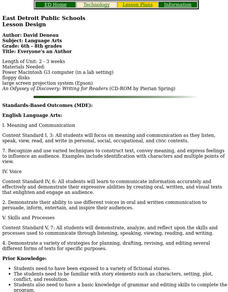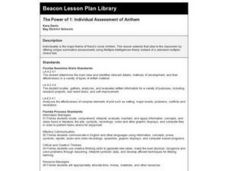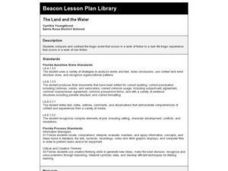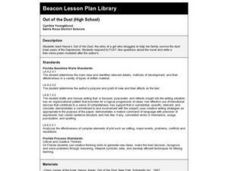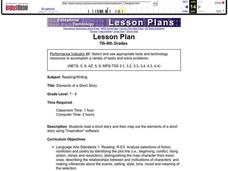Curated OER
Identifying Science Fiction
Students discuss works of science fiction that they read, highlight aspects that made each a part of science fiction genre, identify formal literary elements, and discuss ways each can be developed through science fiction.
Curated OER
Everyone's an Author
Students examine variety of written pieces of quality fiction, discuss what different story elements are present and how those elements make stories as effective as they are, and create a class story.
Curated OER
I Hate My Sibling?
Third graders read the book Jacob Have I Loved, then ask themselves whether they can truly hate their siblings.
Curated OER
The Power of 1: Individual Assessment of Anthem
Young scholars prepare for a Multiple Intelligences based assessment after completing the novel "Anthem." As individuality is a theme in the novel, each student reflects that concept by choosing how best to show understanding of the novel.
Curated OER
The Land and the Water
Third graders read "The Land and the Water," a fictional short story and an article about John F. Kennedy, Jr. and compare and contrast fictional tragedy to a non-fiction tragedy. They fill out a Venn diagram and write an essay using...
Curated OER
Out of the Dust (High School)
Fourth graders read Hesse's "Out of the Dust". They respond to questions about the novel and write a free-verse poem modeled after the author's.
Curated OER
Harriet The Spy
Fourth graders investigate the style of diary writing as its own genre of literature. They read Harriet The Spy in order to have a text for this literature study. Students use the skill of prediction to preview the story, and then...
Curated OER
Haitian Folktales
Seventh graders identify parts of Haitian culture through folktales. They compare and contrast a Haitian folktale with an African American folktale. They read "Bye-Bye" a Haitian folktale. They create and write their own folktale. They...
Curated OER
Portraits of Courage
Seventh graders define courage and illustrate it in a portrait art medium. In this courage and art lesson, 7th graders discuss courage and identify a person who represents its meaning. Students then bring in a visual image of the subject...
Curated OER
Comprehension
Fifth graders take part in a panel discussion. For this character lesson students show their understanding of the connection between events in a story and the development of characters. Students provide evidence from the story to support...
Curated OER
Retelling Nursery Rhymes
Fourth graders explore language arts by reciting a famous nursery rhyme to their classroom. In this oral storytelling lesson plan, 4th graders read the story "The Three Little Pigs" and identify the characters, setting and story....
Curated OER
My Favorite Story
Learners share their pictures on an online database. As a class, they discuss their favorite books and why they like it. They review the elements of a story and brainstorm ideas for each category. To end the lesson, they complete a...
Curated OER
Growing Pains of the Yearling
Fourth graders read The Yearling by Marjorie Kinnan Rawlings.
Curated OER
Elements of a Short Story
Learners read a short story and then map out the elements of a short story using "Inspiration" software. They read 'Tell-Tale Heart' by Edgar Allen Poe.
Curated OER
LOU GEHRIG: THE IRON HORSE
Sixth graders review with the teacher from what person the story is written in and how they have reached that conclusion. They brainstorm ten qualities that Gehrig possessed and create a statement that describes him; giving three...
Curated OER
Elements of a Short Story
Students read a short story, The Tell-Tale Heart and create a story map identifying the elements of a short story included in the selection. Students complete an Accelerated Reader test on the selection.
University of South Florida
Fcat Express: Plot & Conflict Resolution
Strategies to help students understand the elements of a story provided by a standardized test preparation site intended for fourth grade. Includes strategies such as DLTA/DRTA, Plot Diagrams, Story Clock, Story Mapping, Summary...
TES Global
Tes: Hatchet Timeline, Story Grammar, and Conflict Resolution
[Free Registration/Login Required] TES provides a downloadable resource for Gary Paulsen's novel, Hatchet. Graphic organizers are provided to help students analyze the characters, conflicts, and, and grammar connected to Hatchet.
Texas Education Agency
Texas Gateway: Analyze Linear Plot Developments in Literary Texts/fiction
[Accessible by TX Educators. Free Registration/Login Required] This lesson focuses on how conflicts determine the resolution of the story. In this lesson, students learn how to recognize conflict, analyze linear plot, and determine how...
Texas Education Agency
Texas Gateway: Writing a Short Story With Well Developed Conflict and Resolution
A learning module that teaches students about writing a short story in six mini-lessons: Introduction, Understanding the Essence, Getting an Idea, Structuring Plot, Building Conflict, and Outlining Your Own Story.
Northern Virginia Community College
Introduction to Theatre Plot
This site contains, in outline form, Aristotle's "six parts of a tragedy." The Plot is discussed in length on this site. The author goes into the exposition, conflict, climax, and resolution of the plot.
Texas Education Agency
Texas Gateway: Analyze Linear Plot Developments in Literary Texts/fiction
[Accessible by TX Educators. Free Registration/Login Required] In this lesson, you will learn how to recognize conflict, analyze linear plot, and determine how the conflict is resolved.
ReadWriteThink
Read Write Think: Using Picture Books to Teach Plot Development and Confict Res.
Students read picture books to explore the concepts of plot development and conflict resolution. They first learn about the connections between reading and writing, and then revise their own writing. CCSS.ELA-Literacy.CCRA.R.4
University of South Florida
Fcat Express: Teaching Strategies (Reading) [Pdf]
Printable, fifty-five page PDF file of a staff development manual containing strategies for teaching reading. Includes chapters on vocabulary, main ideas and supporting details, author's purpose, chronological order, plot and conflict...



